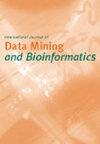加权融合正则化与矢量自回归模型预测微生物相互作用
IF 0.4
4区 生物学
Q4 MATHEMATICAL & COMPUTATIONAL BIOLOGY
International Journal of Data Mining and Bioinformatics
Pub Date : 2015-10-01
DOI:10.1504/IJDMB.2015.072757
引用次数: 1
摘要
本文提出了一种考虑变量间相关性的加权融合的MVAR正则化方法。从理论上讨论了线性模型加权融合正则化的分组效应。利用概率方法,我们发现高度相关预测因子对应的系数差异很小。无论系数符号如何,都给出了这种小差异的定量估计。当考虑经验逼近误差时,如果模型与数据拟合较好,估计也得到了改善。然后,我们将所提出的模型应用于几个时间序列数据集,特别是人类肠道微生物组的时间序列数据集。实验结果表明,新方法比其他几种基于var的模型具有更好的性能,并且我们还证明了其提取相关微生物相互作用的能力。本文章由计算机程序翻译,如有差异,请以英文原文为准。
Weighted fusion regularisation and predicting microbial interactions with vector autoregressive model
In this paper, we develop a novel regularisation method for MVAR via weighted fusion which considers the correlation among variables. In theory, we discuss the grouping effect of weighted fusion regularisation for linear models. By virtue of the probability method, we show that coefficients corresponding to highly correlated predictors have small differences. A quantitative estimate for such small differences is given regardless of the coefficients signs. The estimate is also improved when consider empirical approximation error if the model fit the data well. We then apply the proposed model on several time series data sets especially a time series dataset of human gut microbiomes. The experimental results indicate that the new approach has better performance than several other VAR-based models and we also demonstrate its capability of extracting relevant microbial interactions.
求助全文
通过发布文献求助,成功后即可免费获取论文全文。
去求助
来源期刊
CiteScore
1.00
自引率
0.00%
发文量
0
审稿时长
>12 weeks
期刊介绍:
Mining bioinformatics data is an emerging area at the intersection between bioinformatics and data mining. The objective of IJDMB is to facilitate collaboration between data mining researchers and bioinformaticians by presenting cutting edge research topics and methodologies in the area of data mining for bioinformatics. This perspective acknowledges the inter-disciplinary nature of research in data mining and bioinformatics and provides a unified forum for researchers/practitioners/students/policy makers to share the latest research and developments in this fast growing multi-disciplinary research area.

 求助内容:
求助内容: 应助结果提醒方式:
应助结果提醒方式:


